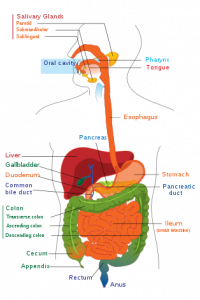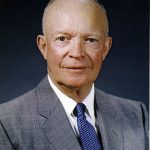The digestive system is made up of the digestive tract and other organs that help in digestive processes. Muscles in the stomach along with enzymes produced by stomach cells break down food particles, which then pass to a long tube called the small intestine. Here other enzymes and other substances produced by cells in the small intestine, liver, and pancreas help in breaking down most of the food particles into smaller, easily absorbable substances. From here, nutrients and molecules are absorbed and transported by blood to other parts of the body. The final process of digestion occurs in the large intestine-also called the colon-through the activity of bacteria that normally live within the colon. The colon absorbs water, ions, and vitamins such as vitamin K and some B vitamins.
Functioning of the digestive system can be affected by many different conditions disorders and diseases. Anatomical problems can arise as a result of a change in the shape of the digestive tract or the way it connects to other organs, while further diseases can result from a lack of particular enzymes, abnormalities in the bacterial flora (Crohn’s disease) or reactions to certain substances (Coeliac disease). Digestive problems may also occur when nerves controlling the digestive system are damaged (Hirschsprung’s disease).

Crohn's Disease
Mulifactorial
1:5,000

Crohn’s disease is characterised by a chronic inflammation of the intestines resulting in abdominal pain, diarrhoea, vomiting and weight loss. The disease is caused by an overreaction to the digestive system’s bacterial flora due to a lack of specific antibiotics, known as defensins, which are secreted by the intestines. One gene known to cause this condition codes for one of these defensins.
Dr. Burrill Crohn, after whom the disease is named, recognized Crohn’s as a particularly Jewish disease, reputedly joking to other doctors that the ailment was brought on either by Jewish genes, Jewish food or Jewish mothers.
There are numerous other well-known suffers such as musicians; Anastasia, Beth Orton, Lew DeWitt, Nicky Hopkins, Mike McCready (Pearl Jam), Daryl Palumbo (Glassjaw), Carrie Grant (Fame Academy), Chris Conley (Saves The Day), actors/actresses; Joe Rogan, Ken Stott, Shannen Doherty, Claire Chitham, Heather O’Rourke and athletes; Kevin Dineen (ice hockey), David Garrard (American football), Theoren Fleury (ice hockey), and George Steele (wrestler), Allister Carter (snooker).
Dwight Eisenhower, the 34th President of the United States was diagnosed with Crohn’s disease in 1956, six months before the presidential election. Once again, presidential staff chose not to disclose this information to the public until a severe inflammation of his intestine forced him to undergo surgery. Recovering from this, he won a second term as president. It has been suggested that King Alfred the Great also suffered and passed on the disease to his grandson King Edred whose digestive malady proved so troublesome that towards the end of his life he would suck the juices out of his food, chewed on what was left and spat it out.

Coeliac Disease
multifactorial
1:120
Coeliac disease (Gr; koiliakόs, abdominal), results from an overreaction to gluten found in wheat, rye, malt, barley and oats in genetically predisposed individuals. This link was first noticed by Dr. Willem Karel Dicke during the Dutch Famine of 1944 where flour was particularly scarce.
Exposure to these products damages the lining of the small intestine, reducing the ability to absorb nutrients. Though not strictly inherited, there appears to be a major genetic component with many patients have one of two types of human leukocyte antigens involved in the immune system and autoimmunity.
In many childhood cases the subsequent nutritional deficiencies can cause a range of symptoms such as diarrhoea, weight loss stunted growth and fatigue. Joe C, the sidekick of rock star Kid Rock, suffered from coeliac disease, sadly dying from its resulting complications at the age of 26.
Hirschsprung's Disease
Intestinal disorders presenting in newborns can be extremely dangerous if not recognised immediately, particularly if a newborn fails to pass a stool properly and is reluctant to eat. Acting couple Denise Welch and Tim Healy’s son Louis was born with a disease known as Hirschsprung’s disease where nerve endings in the bowel do not form properly hindering the passage of digested food and stool. This may require an operation involving removing the affected part of the intestine lacking the normal nerve cells; Louis had a part of his large intestine removed at the age of 6 weeks and has made a full recovery.
Hirschsprung’s disease affects males much more frequently than females and there is a 3 to 12 percent chance that a couple with one affected child will produce another baby with the disease. Both these trends suggest a genetic component to the condition and indeed, a number of mutated genes that play roles in the development of neural cells in the digestive tract during embryonic development, are known to contribute to Hirschsprung’s disease.
